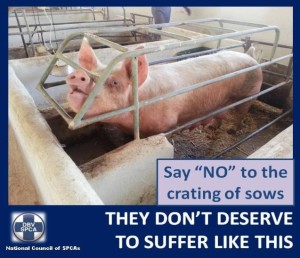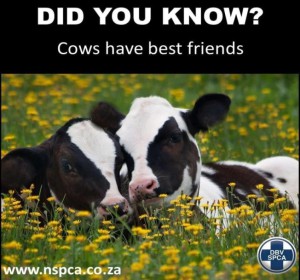Summer braais meet your meat!
- Published:
"The greatness of a nation and its moral progress can be judged by the way its animals are treated”. Mahatma Gandhi
Sharing meals with family and friends and especially the tradition of braaing are about enjoying good company around the gift of food. With the onset of the summer holidays, braaing and eating meat is set to soar. As Earth Keepers we are asking you to think carefully about the meat you buy. Cruelty to animals in factory farms is rife. Many of us have heard about the cruelty to battery hens which are treated as egg and chicken nugget machines. Not as living creatures that feel pain, anxiety and the need to stretch their wings! Please don’t stop reading. We are not trying to spoil your breakfast or your braai! Very few of us knowingly support cruelty to animals. When we buy meat, milk or eggs there are few images to remind us of the warm, sociable animals that provided them. This disassociation allows us to stay in denial and not to ask questions. Factory farming is making us unwitting accomplices in crimes of cruelty.
If we were to look into the eyes of farm animals, what would we see? In truth, fellow creatures betrayed!
 Why fellow creatures betrayed? To answer this, we need to understand how far removed factory farming is from the original partnership of mutual benefit between the ancestors of our domestic animals and early farmers. As early agriculture developed, the wild ancestors of cattle, sheep, goats and horses were attracted by the crops around human settlements. At first they were hunted for meat. With time, farmers recognised the benefits of a living source of animal products and the game changing power of draught animals. The more docile individuals were tamed and selectively bred to be even more manageable and to provide higher yields of wool, meat, milk and eggs. While animals were slaughtered for meat, eating meat was reserved for special occasions and the herds grew. The trade-off for the animals was protection from predators and the availability of reliable food and water provided by the agricultural settlements. Today our domestic animals are far removed from their wild ancestors and are almost entirely dependent on us for their wellbeing. There are still a few examples of traditional farmers who, in the spirit of the original partnership, treat their animals with care and know them as individuals.
Why fellow creatures betrayed? To answer this, we need to understand how far removed factory farming is from the original partnership of mutual benefit between the ancestors of our domestic animals and early farmers. As early agriculture developed, the wild ancestors of cattle, sheep, goats and horses were attracted by the crops around human settlements. At first they were hunted for meat. With time, farmers recognised the benefits of a living source of animal products and the game changing power of draught animals. The more docile individuals were tamed and selectively bred to be even more manageable and to provide higher yields of wool, meat, milk and eggs. While animals were slaughtered for meat, eating meat was reserved for special occasions and the herds grew. The trade-off for the animals was protection from predators and the availability of reliable food and water provided by the agricultural settlements. Today our domestic animals are far removed from their wild ancestors and are almost entirely dependent on us for their wellbeing. There are still a few examples of traditional farmers who, in the spirit of the original partnership, treat their animals with care and know them as individuals.
Consumerism and the commercialization of farming have resulted in a global aspiration for meat as the preferred source of protein at the expense of ethical farming. Factory farming often provides cheaper meat, but the animals are paying a terrible price. So are we! Over consumption of meat combined with the hormones and antibiotics in factory farmed products is making us sick! That is not all! The environmental consequences of too much meat production are devastating, deforesting and desertifying our Earth.
As people of faith, we are not being true to our values of compassion or our connection with creation when we close our minds to the suffering of animals and the damage to the web of life caused by over-production and consumption of animal products. (See the summary table below listing the Five Freedoms that animals should enjoy and some insight into the distress inflicted by factory farming.)
 Cruelty to animals is specifically discouraged in the scriptures of many faiths. “A good deed done to an animal is like a good deed done to a human being, while an act of cruelty to an animal is as bad as cruelty to a human being.” Source: Hadith of the Prophet Muhammad. “Animals are God’s creatures. He surrounds them with his providential care. By their mere existence they bless him and give him glory. Thus men owe them kindness”. Source: Catholic Church, Catechism. The Jewish concept of tsa’ar ba’alei chaim is the obligation not to cause pain to animals. “Ahimsa”, the law of non-injury and non-harming, is the Hindu’s first duty in fulfilling religious obligations to God and God’s creation as defined by Vedic scripture.
Cruelty to animals is specifically discouraged in the scriptures of many faiths. “A good deed done to an animal is like a good deed done to a human being, while an act of cruelty to an animal is as bad as cruelty to a human being.” Source: Hadith of the Prophet Muhammad. “Animals are God’s creatures. He surrounds them with his providential care. By their mere existence they bless him and give him glory. Thus men owe them kindness”. Source: Catholic Church, Catechism. The Jewish concept of tsa’ar ba’alei chaim is the obligation not to cause pain to animals. “Ahimsa”, the law of non-injury and non-harming, is the Hindu’s first duty in fulfilling religious obligations to God and God’s creation as defined by Vedic scripture.
Voltaire is reputed to have said: “Nothing would be more tiresome than eating and drinking if God had not made them a pleasure and a necessity!” We can restore the gift of good food and deepen the connection not just with the people at our table but also with all of creation. There is a ground swell of support for ethical farming practice and Earth Keepers is asking you to help grow it. There are farms that provide meat, milk and eggs from animals that are allowed to live with space to be, eat their natural food and enjoy social contact with their kind. (See list below.) By continually asking for and choosing free range we will be making more compassionate choices.
As awareness and concerns about the implications of eating meat and of factory farming grows, so more people are choosing vegetables and food prepared from plant based protein – even at our braais! Become an explorer of vegetarian braai options and introduce your family and friends to a whole world of new and exciting taste sensations. “Until he extends the circle of his compassion to all living things, man will not himself find peace.” Albert Schweitzer
Article by Kim Kruyshaar for SAFCEI: November 2014
Read more at:
Compassion in World Farming South Africa calls for support to ban sow crates and battery chickens: http://www.animal-voice.org/
Grass Consumer Action clarifies Free Range and gives local examples: http://grassconsumeraction.wordpress.com/2013/09/05/free-range-specifications/
National Society for Prevention of Cruelty to animals: http://www.nspca.co.za/page/free-range-products.
The National Society for the Prevention of Cruelty to Animals recognises Five Freedoms that Animals should be entitled to. How do our factory farms rate in acknowledging them?
[fourcol_one]The Five Freedoms[/fourcol_one][fourcol_one]24 Million battery egg chickens in RSA producing 7 bn eggs a year.[/fourcol_one][fourcol_one]105 000 caged breeding pigs in RSA.[/fourcol_one][fourcol_one_last]160 000 barn confined cows producing 2 bn litres of milk per year[/fourcol_one_last]
[fourcol_one]Freedom from thirst, hunger & malnutrition[/fourcol_one][fourcol_one]Not free to eat natural food. They have dietary deficiencies.[/fourcol_one][fourcol_one]Not free to eat natural food. They have dietary deficiencies.[/fourcol_one][fourcol_one_last]Not free to eat natural food. They have dietary deficiencies.[/fourcol_one_last]
[fourcol_one]Freedom from discomfort[/fourcol_one][fourcol_one]Confined to an A4 sized space per hen, they can barely move.[/fourcol_one][fourcol_one]Confined to a metal crate so small they can’t turn around.[/fourcol_one][fourcol_one_last]Confined indoors in barns. Calves routinely de-budded without anaesthetic.[/fourcol_one_last]
[fourcol_one]Freedom from pain, injury or disease[/fourcol_one][fourcol_one]Need routine antibiotics due to their confined unnatural living. De-beaked and de-toed without anaesthetic[/fourcol_one][fourcol_one]Need routine antibiotics due to confined unnatural living. Piglets castrated, tails docked without anaesthetic.[/fourcol_one][fourcol_one_last]Routinely given rBST hormone causing udders to grow unnaturally large so they often get mastitis and go lame.[/fourcol_one_last]
[fourcol_one]Freedom to express normal behaviour[/fourcol_one][fourcol_one]Can’t move, spread wings or socialize normally. De-beaked so they don’t peck themselves to pieces.[/fourcol_one][fourcol_one]Highly intelligent but have no stimulation. Can’t move or socialize normally. Often go lame due to immobility.[/fourcol_one][fourcol_one_last]Separated from calves in days. Can’t move or socialize normally.[/fourcol_one_last]
[fourcol_one]Freedom from fear and distress[/fourcol_one][fourcol_three_last]Fearful transport & processing for slaughter. Focus is on efficiency not on compassion.[/fourcol_three_last]
Farms and suppliers of animal products from compassionate farmers.
Braeside Meat Market Caroline McCann 011 788 3613 sales@braesidebutchery.co.za
Charlie & Julie Crowther phone 0829565196 jules@glenoakes.co.za
The Boer & Butcher - Boer & Butcher http://boerandbutcher.co.za/index.php - sourcing and selling only free-range meat, including pork.
Phone: +27 (0) 21 976 8627 Email : info@boerandbutcher.co.za
Address : 27 Main Road, Shop 1, Durbanville, 7550
The 2 Fat Butchers - in Port Elizabeth
http://www.foodwithastory.co.za/View-Business/462/The-2-Fat-Butchers
Happy Hog http://www.happyhog.co.za/
Richard Bosman – richard@richardbosman.co.za
Naughty Pork - in Bonnievale, Cape winelands – http://www.foodwithastory.co.za/View-Business/437/Naughty-Pork
Website www.naughtypork.co.za Email sales@naughtypork.co.za
Who we are

SAFCEI (Southern African Faith Communities’ Environment Institute) is a multi-faith organisation committed to supporting faith leaders and their communities in Southern Africa to increase awareness, understanding and action on eco-justice, sustainable living and climate change.
Featured Articles
-

South Africa: Who Ends Up Paying If DMRE Cooks the Price of Nuclear Power?
-

South Africa’s nuclear energy expansion plans continue to draw criticism, environmental NGOs chew over legal challenge
-

Earthlife Africa and SAFCEI respond to latest unsettling nuclear news regarding the ministerial determination
-

Open Wing Alliance Africa (Virtual) Summit 2023
-

The Green Connection and SAFCEI respond to energy minister's divisive and deflecting comments
-

Job Vacancy: FLEAT Coordinator







